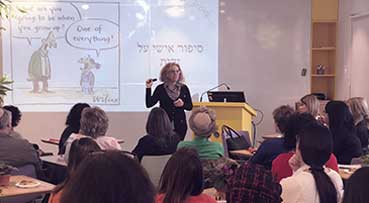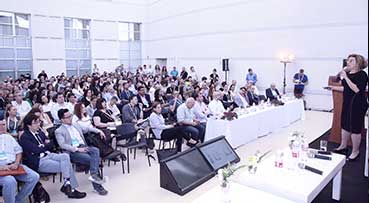This post is about finding without looking, about harnessing chance into opportunity. And about the risk that by offloading our memories to our mobiles we may be left with a superficial information, which in turn will impact the breadth and depth of our thought processes and the knowledge in our lives and our society.
What was your week like? Who did you meet? Did you have coffee with someone? Would it be right to assume that most people you talked to this week are people you know – from work, clients, friends and family? And if you’re now thinking “no, that’s not true, I had a conversation with a new client, or a co-worker I haven’t met before” allow me another question – did you enter this conversation with an end in mind? An agenda?
What this is really about is this question: when was the last time you had a conversation with someone you don’t know without needing something from them, without that conversation having a purpose, trying to accomplish, sell, drive? Just a conversation. And no, I don’t mean the kind you have while waiting in line at the store or at the dentist’s office. This is about having a real conversation, one that lasts more than a few minutes, unplanned, with no purpose or end in mind.
Why is Serendipity important?
You might be familiar with the term “Serendipity”. But do you know that it is one of the ten words in the English language that is hardest to translate? For most languages, when you enter the word Serendipity into Google Translate, you will get back the same word.
Serendipity is about finding without looking. Or according to the Oxford Dictionary:
The occurrence and development of events by chance in a satisfactory or beneficial way
The key word here is Chance.
The risk of the Google Effect
Nicholas Carr writes about technology and culture and in his new book “The Glass Cage: Automation and Us” he reminds us that our brains are not like those of a computer. It is through are brains that we make the connections between what we know and feel. And, it is those connections which create personal knowledge. If we don’t make rich connections in our brains, we will not create knowledge. And these connections require that we pay attention and that we collect information and remember it. Carr refers to what is now called The Google Effect, defined as a “digital memory loss” or the tendency not to remember information, which can easily be found on the web through search engines. In a Kaspersky Lab report titled The Rise and Impact of Digital Amnesia this was referred to as the tendency to treat our mobile devices as a direct extension of our brains.
Almost all (91.2%) of those surveyed agreed that they use the Internet as an online extension of their brain. Almost half (44.0%) also admit that their smartphone serves as their memory–everything they need to recall and want to have easy access to is all on it.
Think about it. How many of us remember the phone numbers at the homes of our childhood friends, back from the days when we didn’t even have memory buttons on the phones? But do you remember the cellphone number for your children? Your spouse? Or do you leave that up to your cellphone to remember? …
The risk for us, as human beings, is that the combination between the Google Effect and the distractions of the multiple screens may lead to superficial handling of information, which in turn will impact the breadth and depth of our thought processes and the knowledge in our lives and our society. This is quite concerning if you understand that memory and thought are not separate processes, and that the more we remember the more material our brains have to work with, to enhance our thoughts and increase our creativity. So, if we replace our memories with our mobile devices, we might search for information but fail to remember it or learn from it. In order to form new knowledge and creative thought, we need that information to stay in our heads, to be learned and remembered and to be there for future processing. Regardless of how we came by that information, we need to make it part of us.
A University of Waterloo study identified two types of people relative to this issue. The first type are those, who when they need information go directly to their mobiles as a substitute for their brains, and search for that information. These are the people who are content with someone else simply telling them the answer. And the second type? These are the people who first try to figure it out, based on what they already know. They rely first on their brains, and will only go to the web when that information is not there.
Why does it matter? Obviously, there is nothing wrong with finding information on the web since its mostly readily available and accurate. The issue according to the research is that we get used to quick and easy answers and we don’t know how to research and ask questions when it is not there. We don’t learn to think and struggle with the question and the information and test it for accuracy and common sense. We then don’t learn to separate good from bad information and take it as it is, on the web.
Now let’s get back to your week.
In the old world, in small villages where everyone knew everyone else, new and exciting knowledge came with the foreigners who wandered in and told us of faraway lands. One might think we are very far from that world, since through travel and technology we have access to anywhere we want to visit and whatever we want to know. But is that really so? What era did you live in this week?
Most of us arrive at the office every morning and meet the same dozen or two people we are used to engaging with. Maybe, if you are in sales or service providers, you meet many more customers but it would probably be fair to say you don’t really “meet” them. If that is true for you, then ask yourself how far are you really from that little village in the 1800’s. How will you find new knowledge, an unexpected lead, something that opens up your world to a different view? Who is your foreigner, who visits your village and opens up your world to stories of faraway lands?
So what can we do?
There are many ways today to find without looking. Surfing the web could be one of them. But for that to be Serendipity, it needs to be Surfing, not searching…
Take LinkedIn for example. Do you use it to search for a job or advertise your service? Consider using LinkedIn to identify and build networks of like-minded people around common topics of interest. With links such as these, there is a good possibility that you will find interesting people you’ve never met, articles you didn’t know existed on topics you would love to know more about. If you keep surfing, you might discover new areas and make connections you couldn’t have made without the information you now have, but wouldn’t have known to search for. Now you are there, where you find without even looking.
RSS readers are another group of applications worth knowing for serendipity. They create for us a personalized newspaper, collecting content from websites, blogs, media and pulling in together for us in one place, so that we can quickly browse and possibly find, without looking…
In the book Silver Ace: The Intelligences team Dr. Dov Yanai and Netta Ness talk about Chance Management. You might be thinking “Chance Management” sounds like an oxymoron but Yanai & Ness will tell you that management and chance should be put to work together. Only when you combine chaos with focus, randomness with planning, do you get personal and organizational growth. The idea is that uncertainty is a given in our world today so we might as well view it as an advantage and not a constraint and recognize that it is the basis for opportunity. And as we become more open to uncertainty, as individuals and as organizations, we are more likely to see and accept it, maybe even harness it to our advantage. According to the authors, the ability to turn chance into opportunity is a rare skill requiring the courage to take your needs and objectives into areas of new content, new people, new places where they can meet opportunity.
Dr Seuss captured this theme in his wonderful book Oh, The Places You’ll Go!:
“… you may not find any (streets) you’ll want to go down. In that case, of course, you’ll head straight out of town.It’s opener there in the wide open air. Out there things can happen and frequently do to people as brainy and footsy as you…”
I remembered this quote during a recent coffee conversation with Udi. I met Udi without looking. This was our second conversation. He asked me where I was going with this, my blog, my newspaper articles? How did they fit in, I had a day job, what was all this for?
I have no idea, I told him. You see, I’m on this serendipity journey for a few of years now, engaging with all of you, writing, meeting new people, learning new things. And unlike what I was used to, this one had no purpose, no goal. I was not looking, but I can’t even begin to tell you what I have found!!!

![large-AX1A2125-2[1]](https://niritcohen.com/wp-content/uploads/elementor/thumbs/large-AX1A2125-21-pnzedcs72atx5aeurqytqdiihxixlq02re9mlz805s.jpg)






